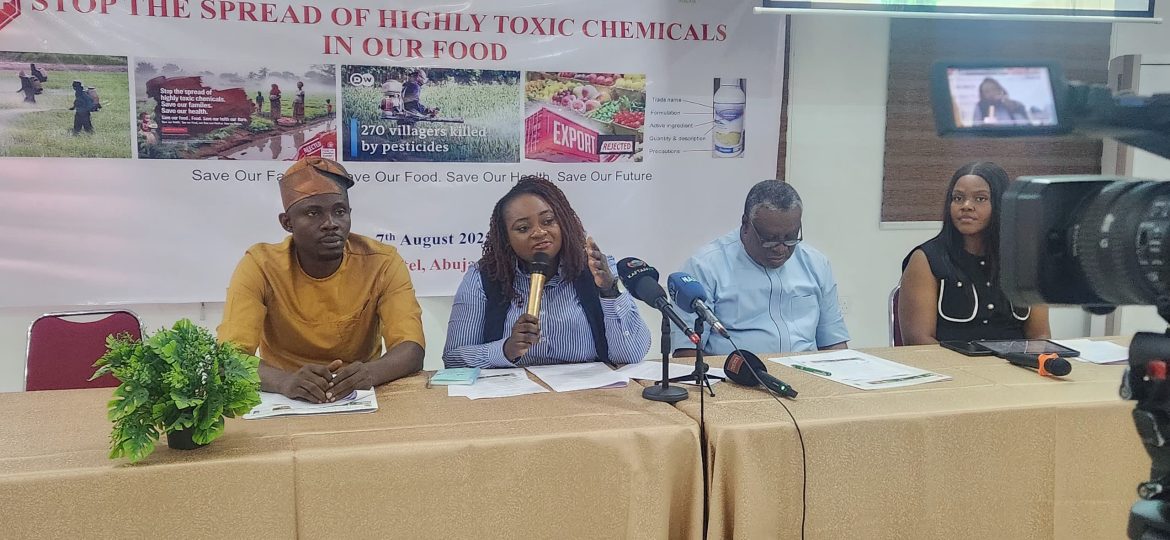1.6K
By Daniel Adaji
Regulatory lapses in enforcing Nigeria’s ban on toxic agrochemicals are endangering lives and putting the country’s food exports at risk, stakeholders have warned.
In 2020 alone, no fewer than 270 villagers reportedly died due to exposure to hazardous pesticides, while Nigeria loses about $362.5m annually from the European Union’s ban on its beans exports over pesticide residues.
More than 76 per cent of Nigeria’s agricultural exports are routinely rejected by the EU for safety concerns related to banned chemicals still permitted locally.
Experts and stakeholders raised the alarm on Thursday at a media briefing organised by the Alliance for Action on Pesticides in Nigeria (AAPN), themed “Stop the spread of toxic pesticides in Nigeria—protect our health, food and environment.”
Legal Lead at AAPN, Oreoluwa Adelakun, decried the widespread use of harmful agrochemicals distributed under various government and legislative programmes, despite safer alternatives being available.
“Across Nigeria, various government programmes—including those facilitated by legislators, ministries, and development actors—routinely provide farmers and communities with agricultural inputs such as chemical fertilizers and pesticides,” Adelakun said.
While acknowledging the importance of pesticides, she noted that their use comes with “deeper and bigger challenges across public health, trade, and environmental domains.”
She warned that over 65 per cent of active ingredients in pesticides used in Nigeria are classified as highly hazardous and have been banned or tightly regulated in other countries due to serious health and environmental risks.
Co-founder of AAPN and food safety expert, Prof. Simon Irtwange, expressed concern over the continued use of more than 400 pesticide formulations in Nigeria, over half of which are deemed highly hazardous and banned in the EU, United States, and parts of Asia.
“These include chemicals used widely in Nigeria’s food production systems and distributed through constituency projects, farmer groups and associations, and philanthropic donations,” he said.
He cited data showing that Nigeria uses approximately 23,400 metric tons of pesticides annually, with farmers and agro-companies spending around $400 million each year on these chemicals. Surveys reveal that up to 75% of women farmers report health issues linked to pesticide use, and over 80% of pesticides used by smallholder farmers are hazardous.
“Frequent health issues include respiratory problems, skin rashes, nausea, vomiting, eye irritation, and in chronic cases, endocrine disruption, immune malfunction, neurotoxicity, reproductive disorders, and various cancers,” he added.
Irtwange blamed the National Agency for Food and Drug Administration and Control (NAFDAC) and the Federal Competition and Consumer Protection Commission (FCCPC) for what he described as a failure to enforce pesticide regulations.
“We call attention to the ongoing failures of NAFDAC and FCCPC,” he said. “No continuous visible enforcement of bans or restrictions on known toxic pesticides persist—just one-off arrests. There are no robust public warning systems, no tracking or sanctions for violators.”
He further condemned the continued sale of these hazardous products online and offline, urging regulators to act.
“We strongly condemn both physical and online sellers who continue to profit from these hazardous products in defiance of regulations,” he added.
Adelakun called on legislators and philanthropists to ensure transparency and legality in distributing farm inputs.
“They should only distribute pesticides that are legally permitted, safe for humans and the environment, and meet international or national quality standards,” she said. “Legislators and philanthropists must move from unchecked benevolence to responsible, transparent, and answerable support.”
Also speaking at the event, Environmental Toxicologist and Policy Advocate at the Sustainable Research and Action for Environmental Development (SRADeV), Mr. Victor Fabunmi, urged the government to immediately review and enforce national pesticide regulations.
“There’s an urgent need to review NAFDAC registration and regulations of pesticides,” he said.
“There must be commitment from manufacturers to take back obsolete pesticides in collaboration with NESREA,” he added.
He recommended the introduction of a mandatory Producer Responsibility Organization (PRO) for pesticide value chain management as a prerequisite for importation.
Representing farmers at the event, President of the All Farmers Association of Nigeria (AFAN), Dr. Farouk Mudi, stressed the urgent need to protect Nigerian farmers and consumers from the harmful effects of toxic agrochemicals.
“As the President of AFAN, I speak not just for our farmers, but for every Nigerian who eats food, drinks water, and hopes for a healthier future,” Mudi said. “Our farmers are the backbone of this nation, yet they are exposed to dangerous and harmful pesticides.”
He decried the involvement of government-backed projects in distributing these toxic substances and urged farmers to be vigilant.
“Don’t just accept everything handed to you without knowing its impact on your health, your family, and your future,” he noted.
“We call on NAFDAC, the Consumer Protection Council, the National Assembly, and the Executive Arm of Government to act swiftly,” he said.
Mudi also announced AFAN’s plan to convene a national General Assembly of Farmers and sign an MoU with partners to safeguard the country’s agricultural systems.
“Nigerians deserve safe food, responsible governance, and a toxic-free agricultural system,” he said.
“Together, we must act – to protect our food, our health, and our future.”



